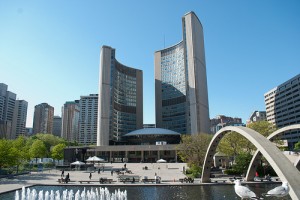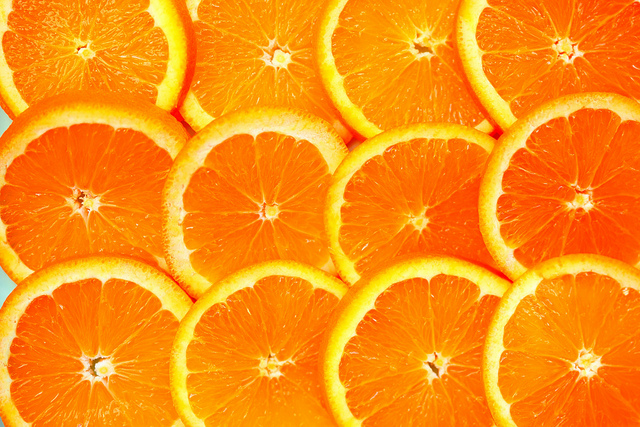We’re pretty disappointed that members of the municipal government in our hometown, Toronto, are pushing to step away from their buy local food policy. It seems very shortsighted to curtail a policy that is good for the health of our citizens, good for the planet, and helps local food producers – simply to “get the biggest bang for our buck”.
If you’d like to send a message to City Hall on this issue, the good folks at Toronto Environmental Alliance have put a petition online you can sign by clicking here.
Written by Melanie Kozlan, Four Green Steps.com
Finding yourself inexplicably gloomy or a little depressed from the miserable weather? Feeling down might be an indicator that you’re missing out on essential mood-boosting nutrients. Here’s a list of healthy foods proven to make you feel instantly happier:
Tryptophan-Rich Foods
Tryptophan is one of the ten essential amino acids and helps our brains produce serotonin, which makes us feel relaxed and in control. Food that has tryptophan can help fight depression, insomnia and anxiety. Foods containing tryptophan include:
- Milk (Vegan? Drink hemp milk- hemp seeds contain all ten essential amino acids!)
- Cashews
- Sunflower Seeds
- Pumpkin Seeds
- Bananas
- Avocados
*For the full effect of tryptophan it is best to eat these items uncooked.
Fruits rich in Antioxidants & Vitamin C
Fruit like blueberries and oranges are known to contain a high amount of antioxidants and vitamin C, both are helpful for reducing feelings of stress.
Vegetables Rich in Antioxidants & Folic Acid
Spinach, broccoli and kale are full of folic acid which help produce serotonin (just like tryptophan does).
Chocolate
Contains anadamine, a chemical naturally found in the brain that is know to brighten our mood and make us feel happier. Enjoy in moderation as the sugar in chocolate might contribute to other issues.
Nuts
Nuts are rich in minerals, protein and omega-3 fats. Omega-3 is not only good for both your heart and brain, large doses of it have been used to treat clinical depression. Nuts also contain vitamin E, an antioxidant that combats stress. Brazilian nuts such as cashews, almonds and pistachios have been proven to lower blood pressure and calm our nervous system.
Melanie Kozlan is the Senior Content Director of Four Green Steps
– your one-stop destination for all things green! Four Green Steps is home to the World’s largest Green marketplace, offering an eco-friendly alternative to virtually everything as well as a free ecological curriculum used by students from all around the globe.
Thanks to David Newland, of Roots Music Canada, for contributing this post.
With the celebration of springtime fully upon us, many folks are taking this time to count their blessings.
For me, two of the most important ones are food, and music. Both are nourishment: food for the body, music for the soul.
On weekend mornings, I love to head to my local farmer’s market whenever my schedule allows. I take a set amount of money out of the bank, grab my canvas shopping bags and a good strong coffee, and saunter off to browse through the wares.
What I’m looking for, I’ve realized, is not so much the basic sustenance my body needs – I could get that anywhere, and cheaply. The reason I go to the market is that I am seeking nourishment beyond nutrition.
Food that’s locally grown, for example, is important to me. So is being able to have a conversation with the person who produced it. So is knowing as much as I can about what goes into the food, the practices used to grow or raise it, the philosophy of the vendor, and so on.
At my local market, there’s more than food. There are crafts, there are activities for the kids, there’s nature, community, art, and education. Oh – and there’s a girl who plays the fiddle. Throw her a couple of bucks and she stops to thank you. When she’s not there, it feels like something is missing.

And that makes sense. Music and food, these these two basic blessings, share so much in common. Both are easily found – most people reading this post have more food, and more music, than they need. Yet both are frequently found in a form so watered down, the higher value has been lost. You can buy mass-produced music, just as you can buy mass-produced food, and it will perhaps fill your basic entertainment needs.
But the equivalent of a community market is where they both belong.
Mass production is to music as factory farming is to food. Perhaps a necessity, certainly a reality of ordinary life – but not the only way to experience this bounty.
It’s another thing entirely to enjoy music being played live in a decent environment, to shake hands with the artist, to hear your own concerns expressed, to feel your values have been respected, to appreciate the work that goes into making it, and to feel you are working with the artist – just as you might work with a farmer – in partnership around this great sustaining nourishment of the soul.
Music and food, mindfully made, are a natural pair.
Add family and friends and you have all the blessings of a perfect spring holiday weekend.
Here’s hoping you enjoy yours in happiness and health, in body and in spirit.
I came across some fascinating photos today by San Antonia TX-based photographer Mark Menjivar, who traveled the US examining food issues and photographing people’s fridges as he found them, warts and all.
“One person likened the question, ‘May I photograph the interior of your fridge?’ to asking someone to pose nude for the camera.”
Mmmm. Fridges are kinda personal.
The exhibit is called You Are What You Eat.
Enjoy, my voyeuristic friends!
With tomorrow’s municipal elections in mind, I just came across an interesting reminder by Debbie Field, Executive Director of FoodShare Toronto, about the important role food plays in our communities:
www.foodshare.net/foodpolicy-cityagenda.htm.
Let’s make good food more accessible, not less.
Ever been to the Greenmarket at Union Square in NYC?
They got it goin’ on.
I had the pleasure of visiting this market a few days ago and, chatting with one of the GrowNYC reps, I learned that it has been around since 1976.
What struck me about this market, I mean, aside from being open an impressive 4-days a week, year round, and hosting over 140 different local suppliers who provide New Yorkers with picked-that-day-or-the-day-before fruits and vegetables, it was that this market was situated right downtown in the middle of all the action.
Any farmer’s market I’ve ever seen has been sequestered away in a residential neighbourhood, often with operating hours that only the stay-at-home can adhere to.
But the Union Square Greenmarket sits right there like an icon to grassroots urban development; in a previously crime-ridden neighbourhood, this market now holds its own amongst office towers, megastores and trendy boutiques.
No doubt there is a price tag attached to this convenience, but the place is packed! Proving that movers & shakers, students, chefs, hipsters, neighbours and tourists are willing to rub shoulders and strike up some small talk all for the sake and the pleasure of eating some real food.
This is a market that is located where the people are.
If you’re in NYC, do check it out. This is how it should be.

The Great Big Crunch is when 700 students gather on the front lawn of Queen’s Park and simultaneously bite into a fresh, local apple. And it’s happing this Friday at 2pm, Oct. 8.
The Great Big Crunch is part of a province-wide Eat-In Ontario fall harvest celebration, which aims to teach students of all ages the joys of cooking, growing and tasting good, healthy food.
Eat-In Ontario is part of FoodShare’s Recipe for Change initiative, which is working hard to improve food literacy across Ontario.
So pack an apple and come on down to show your support! It’ll be worth the trip just to see 700 kids do anything simultaneously.
Who: Students, JK-12 and anyone else who eats food
Where: Front lawn Queen’s Park
When: Fri, 8 Oct. 2 pm
Why: Because good healthy food matters, and not just for kids

The End of Food — How the food industry is destroying our food supply — and what you can do about it
By Thomas F. Pawlick
This is the book I had wanted to write after I completed my natural nutrition program. Turns out it was part of the curriculum.
Pawlick, an investigative science journalist and experienced organic farmer, takes a critical look at our current food production practices in North America and blasts our misguided system that places profit over quality and sustainability.
He starts with a story about a single bright red tomato and a simple question that we have all asked: why is it so hard?
This question introduces a fascinating look at incredible industrial farming practices that have left our soil depleted of the nutrients it needs to produce plants of any nutritional value, poisoned water systems, destroyed wildlife, spread disease, ruined rural communities and, I would say, endangered the health of the general public.
The End of Food is informative, scary, sometimes dizzying and downright depressing, but Pawlick is trying to piss us off. Why? Because there’s no reason we need to be doing this. These are man-made problems that began in an era when we didn’t know any better. But we know better now, and Pawlick argues it’s time to do something about it. I agree.
The End of Food is an absolute must-read for anyone interested in the quality of the food they eat.
A few years old but great insights from this Ted Talk.
I have a confession to make. In the last federal election, I voted for the Green Party because Elizabeth May, like her or not, was the only candidate who mentioned food quality as a concern. Needless to say, she didn’t get in. But now in the run up to Ontario’s municipal elections in October, it looks like food might be back on the table.
Tomorrow morning in Toronto, the Canadian Urban Institute in collaboration with the Cities Centre at the University of Toronto is putting on a breakfast seminar on how and why food fits in the election agenda.
“How should we think about food? … We need to think and act very differently about how we grow, process, distribute and consume our food. Improved access to healthy and abundant locally-produced food is a worthy goal shared by the City of Toronto’s Board of Health…”
I should say so.





